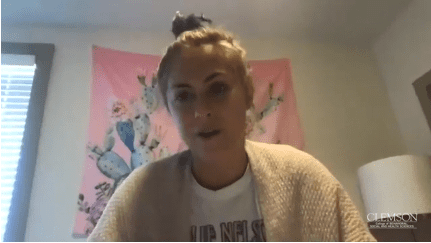[vid origin=”youtube” vid_id=”iQ-3BbyOG90″ size=”small” align=”right”]
Andrew Pyle, an assistant professor in Clemson’s communication department, said that as a student himself, procrastination was his typical mode of approaching his studies and work. However, that all changed once Pyle read Cal Newport’s “Deep Work.” The strategies Newport outlined in the book helped Pyle revolutionize the way he approached his own work.
Pyle was so inspired by the book he began building a course that could help students discover the positive benefits it took him many years to figure out. The focus of Pyle’s Deep Work: Critical Thinking course is to explore best practices in both research literature and popular press works related to concepts such as productivity, focused work, flow, and mindfulness.
[vid origin=”youtube” vid_id=”ljxgJjmtKrA” size=”small” align=”left”]
“It also seemed like a neat way to get students into the mindset of doing some interesting research by testing the recommendations in the literature with their own lived experiences,” Pyle said. “Students study and critique work multiple areas by not only engaging in extensive reading and discussion, but also by applying many of these best practices to their own lives over the course of the semester.”
Each student builds their own productivity plan, tracks their own time and builds their own journals over the course of the semester. The work is focused on their individual experiences. Students also take time each week in class to engage in discussion, learn from each other, offer critiques to each other and seek feedback on work they’ve completed. Students also complete a website to showcase their work.
The course has been highly interactive, both before and after the move to Zoom sessions when the university moved to e-learning because of COVID-19. Through Zoom, four students from the College of Behavioral, Social and Health Sciences outlined their personal and professional development from the unique course.
[vid origin=”youtube” vid_id=”K_cSBQXYk0Y” size=”small” align=”right”]
Brooke Tannehill, a junior communication major, shares how the course is designed to help students both personally and professionally. Tannehill has enjoyed the personalized aspects of the course but feels the collaborative structure of the course encourages her to be even more accountable to meet her own goals and support her classmates in meeting their goals.
Mason Hebert, a senior sports communication major, outlines the structure of the course and her day-to-day involvement in the course. She discusses the literature read and details her journaling process. Through this course, she found she has been more aware of her distractions and better able to manage them. She is grateful for a course which has allowed her to increase her productivity and implement strategies that work as she prepares for taking the LSAT in June.
[vid origin=”youtube” vid_id=”Egdtl1UywNY” size=”small” align=”left”]
Sports communication and economics major Duncan Crowder shares how the course has been an eye-opening experience for him as a freshman in college and has changed the way he views himself as well as the way he acts and behaves. Crowder focuses on the importance of mindfulness and intention he gained from the course and how noting his successes and failures each day has benefited him in learning new strategies for productivity throughout his first year at Clemson.
Senior Riley Roche is a communication and philosophy major. She discusses the deep work philosophy presented in the course. In addition, she notes how she always considered herself a multi-tasker but since taking this course has a new level of pride and feels she is able to produce better content when she focuses on one task at a time.
To visit the website the class created to showcase its work, click here.
Get in touch and we will connect you with the author or another expert.
Or email us at news@clemson.edu

